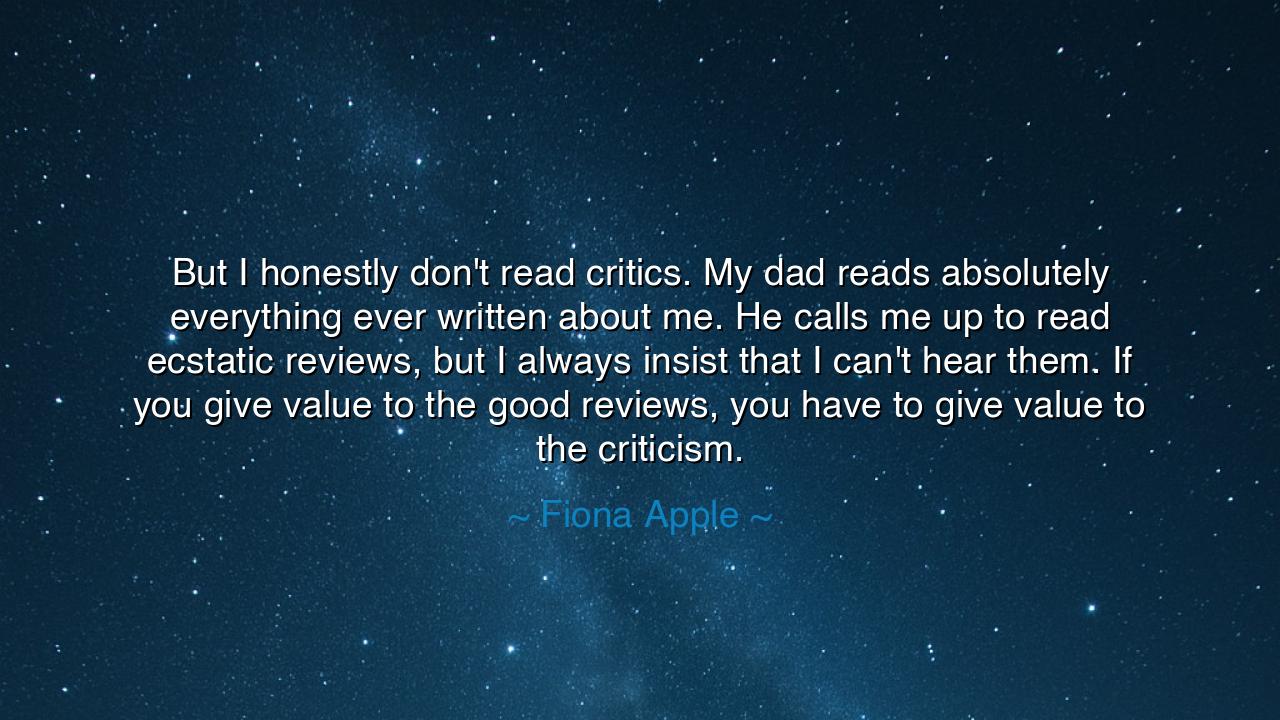
But I honestly don't read critics. My dad reads absolutely
But I honestly don't read critics. My dad reads absolutely everything ever written about me. He calls me up to read ecstatic reviews, but I always insist that I can't hear them. If you give value to the good reviews, you have to give value to the criticism.






The words “But I honestly don't read critics. My dad reads absolutely everything ever written about me. He calls me up to read ecstatic reviews, but I always insist that I can't hear them. If you give value to the good reviews, you have to give value to the criticism.” were spoken by Fiona Apple, a musician whose art is raw, poetic, and fiercely true to the spirit of authenticity. Beneath her humility and honesty lies a timeless truth — the wisdom of detachment, the discipline of guarding one’s soul from the fleeting noise of praise and blame alike. In her words lives the ancient struggle between self-knowledge and public judgment, between the call of the heart and the roar of the crowd.
To not read critics is not to reject feedback or to live in pride — it is to protect the fragile flame of creation from the winds of approval and disapproval that can so easily extinguish it. Fiona Apple understands what the sages of old have long taught: that a life devoted to the opinions of others becomes a prison of mirrors, each one reflecting not truth, but distortion. The artist, like the philosopher, must learn to stand alone in the storm — to know the worth of their own voice without needing to hear its echo in the mouths of others. For the one who seeks to please all will soon lose sight of what is real.
When she says, “If you give value to the good reviews, you have to give value to the criticism,” she speaks to the law of balance — an ancient truth recognized by Stoics and saints alike. To crave applause is to invite the sting of rebuke; to rejoice in praise is to make oneself vulnerable to scorn. The wise, therefore, walk the middle path: they neither inflate their hearts with compliments nor allow them to be pierced by insult. Equanimity — the calm acceptance of both — is the mark of the truly free spirit. Fiona’s words remind us that true peace lies not in approval, but in integrity.
In the days of the ancients, Marcus Aurelius, emperor and philosopher, faced this same dilemma. Surrounded by both adoration and betrayal, he wrote to himself in his Meditations: “Receive wealth or prosperity without arrogance; and be ready to let it go.” He could easily have replaced “wealth” with “praise,” for both are fleeting treasures of the world. The Stoic emperor knew that if he allowed the cheers of the crowd to define him, then he would also be broken by their jeers. Like Fiona Apple, he sought to keep his inner world sovereign — untouchable by the judgments of others.
Yet Fiona’s words also hold tenderness, seen in her mention of her father, who eagerly reads every word written about her, rejoicing in her triumphs. This image is deeply human — a reminder that love often wishes to celebrate what the beloved cannot bear to hear. It reveals that even in rejecting praise, there can be love and longing, a shared pride between parent and child. Her refusal to listen is not ingratitude, but discipline — a quiet act of devotion to her craft. She knows that to remain true to herself, she must silence both the flattery that tempts and the criticism that wounds. In doing so, she guards the sanctity of her inner world, where creation is born.
This quote, then, is not only about art — it is about life itself. Every person, artist or otherwise, is surrounded by voices: opinions, expectations, judgments. Some will exalt you, others will condemn you. But to live by those voices is to drift like a leaf upon the river of others’ moods. The wise do not anchor their worth in external approval; they seek truth within. Praise can be pleasant, but it does not define you. Criticism can hurt, but it does not diminish you. Both are passing weather; your soul is the mountain beneath.
The lesson, therefore, is clear and enduring: do not measure your worth by what others say — neither their songs of admiration nor their words of reproach. If you live for praise, you will die by judgment. Instead, cultivate an inner stillness — a self so rooted in purpose that no wind of opinion can sway it. Listen not for applause, but for the quiet voice of conscience. Like Fiona Apple, be steadfast in your truth: do your work not to be admired, but because it is the calling of your soul.
And so, remember this teaching, children of tomorrow: the world will always speak — it will shout your name, then forget it. But your work, your integrity, your faithfulness to your own heart — these are eternal. Be as the ancients counseled: indifferent to praise, unshaken by blame, and guided only by truth. Then, like Fiona Apple, you will find the only approval worth having — that of your own spirit, at peace within itself.






AAdministratorAdministrator
Welcome, honored guests. Please leave a comment, we will respond soon